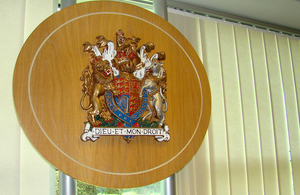Government publishes changes to growth rates and R value
The latest growth rate for the whole of the UK is between -1% to -4% and the R estimate for the UK is between 0.8-0.9. A growth rate between -1% to -4% means the number of new infections is shrinking by between 1% to 4% every day. However, we are starting to see early indications that these values may be increasing. This is not yet reflected in these estimates because the data used to calculate R and growth rate reflect the situation from a few weeks ago. It is also important to recognise that these are estimates, and there is a high degree of uncertainty with them.
The Scientific Pandemic Influenza Group on Modelling (SPI-M), a subgroup of SAGE, use several different models, each using data from a variety of sources to estimate R and growth rate. Epidemiological data, such as hospital admissions, ICU admissions and deaths, usually take 2 to 3 weeks for changes in the spread of disease to be reflected in the estimates. This is due to the time delay between initial infection and the need for hospital care. As a result, the figures published today more accurately represent the average situation over the past few weeks rather than the situation today.
Models that use COVID-19 testing data that have less of a time delay, have recently suggested higher values for R in England. For this reason, SAGE does not have confidence that R is currently below 1 in England. We would expect to see this change in transmission reflected in the R and growth rate published over the next few weeks.
Estimates of R and the growth rates per day are less reliable and less useful in determining the state of the epidemic when disease incidence is low, or where there is significant variability in the population, for example during local outbreaks. When this is the case the estimates of R and the growth rate become insufficiently robust to inform policy decisions. Both are average measures and will smooth over localised outbreaks or over short periods of time.
When case numbers are low, uncertainty increases and fluctuations in the data can have a significant impact on the estimates. Furthermore, when there is a significant amount of variability across a region, for example due to a local outbreak, then a single average does not accurately reflect the way infections are changing throughout the region.
The latest calculated growth rates and the latest regional R values are:
| Region | R | Growth rate % per day |
|---|---|---|
| UK* | 0.8-1.0 | -4 to -1 |
| England | 0.8-1.0 | -4 to -1 |
| East of England** | 0.7-1.0 | -6 to -1 |
| London** | 0.8-1.0 | -4 to 0 |
| Midlands | 0.7-0.9 | -6 to -2 |
| North East and Yorkshire** | 0.7-0.9 | -6 to -2 |
| North West** | 0.8-1.1 | -5 to +1 |
| South East | 0.8-1.0 | -3 to 0 |
| South West** | 0.8-1.1 | -4 to +1 |
*The UK estimate of R is the average over very different epidemiological situations and should be regarded as a guide to the general trend rather than a description of the epidemic state.
**Low case numbers and/ or a high degree of variability in transmission across the region means these estimates are insufficiently robust to inform policy decisions.
Estimates of the growth rates and R are currently updated on a weekly basis. However, as the numbers of cases decrease, these metrics will become less helpful indicators and other measures need to be considered.


